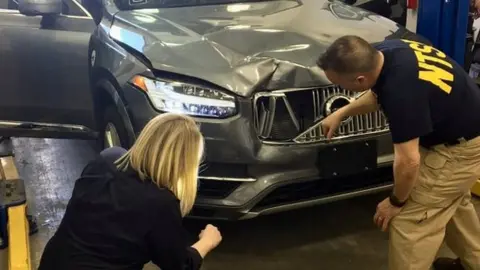Uber ends Arizona driverless car programme
 Reuters
ReutersUber has pulled the plug on its self-driving car operation in Arizona two months after a pedestrian was killed in an accident involving one of its cars.
However, the ride-hailing company said it hopes to resume self-driving tests in Pennsylvania this summer.
The firm said it was committed to self-driving technology and "looked forward to returning to public roads".
It comes as the firm reported a huge jump in bookings for its main taxi business for the three months to March.
Uber began testing its first self-driving cars in Pittsburgh, Pennsylvania in 2016, gradually expanding to other places, including Arizona, San Francisco, California and Toronto.
It halted all those operations in March after the crash, which sparked debate about the readiness and safety of driverless car technology.
Jobs lost
The firm is also conducting a "top-to-bottom safety review" of its self-driving programme, including software and training.
Uber hopes to resume tests this summer in Pittsburgh after federal officials conclude their investigation of the accident.
After that, it will look at other locations.
About 300 workers for the firm's self-driving programme in Arizona will lose their jobs. The more than 500 employees of its traditional taxi service in Arizona are not affected.
Arizona's governor, who had championed driverless cars, ordered the company to stay off the road amid an outcry over the accident.
 Getty Images
Getty ImagesHuge growth
On Wednesday Uber reported it had almost halved its losses in the first quarter of 2018 as ride bookings jumped 51% from last year to $11.3bn.
Revenue, which subtracts driver payments and other items from bookings, climbed 73% to $2.6bn.
The San Francisco-based company, which has faced a spate of scandals and retreated from overseas markets, said quarterly profits were $2.5bn, due largely to the sale of business units in Russia and south east Asia.
Excluding such one-off items, the firm's losses totalled $312m - an improvement from $598m a year ago.
Uber boss Dara Khosrowshahi said Uber was likely to remain in the red as it reinvested in its food-delivery and new bike-renting services.
"Given the size of the opportunity ahead of us and our goal of making Uber a true mobility platform, we plan to reinvest any over-performance even more aggressively this year, both in our core business as well in big bets like Uber Eats globally."
